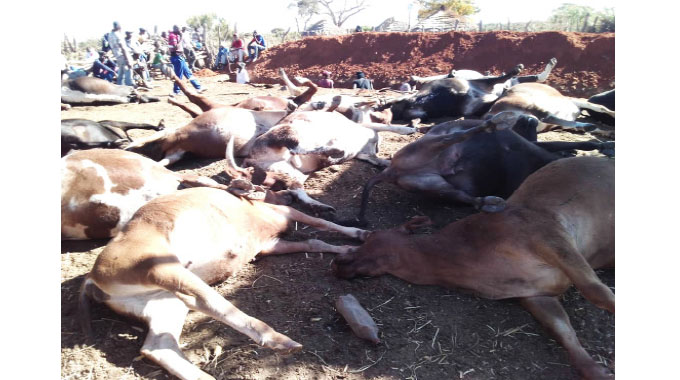The Chronicle

YESTERDAY our sister paper The Herald reported that the police in Harare last week raided the Veterinary Medicines General Dealer (also known as Veterinary Distributors) at Westgate Mall and seized three truckloads laden with expired, counterfeit and unregistered veterinary medicines.
The raid was conducted by the Criminal Investigations Department’s and Narcotics Unit, working with the Council of Veterinary Surgeons and the Medicines Control Authority of Zimbabwe.
The report comes hardly weeks after a Nkayi family lost 21 cattle after administering a grain protectant that they had mistaken for dozing tablets.
 Some of the Nkayi poisoned cattle
Some of the Nkayi poisoned cattleThe sale of illegal veterinary drugs in the country should worry both farmers and consumers as the effects could also be fatal as was the Nkayi case.
More critically, the raid comes at a time Government is implementing the Livestock Growth Plan which seeks to grow the sector to US$1,9 billion by 2025 and the sale of illegal veterinary drugs in the country threatens to reverse the envisaged country gains.
To protect both livestock and consumers, the police are urged to leave no stone unturned in rooting out peddlers of these fake drugs as they are a serious danger to society.
According to a 2017 report by global animal medicines association Health for Animals titled, “Illegal Veterinary Medicines: Impact and Effective Control,” illegal veterinary medicines include counterfeit, falsified and unregistered products and unapproved parallel imports.
“They also include compounded pharmaceuticals and illegal autogenous vaccines when these products are not manufactured or used appropriately and according to regulations,” says the report.
“The risks of illegal veterinary medicines are principally issues of safety with secondary effects on business reputation and costs, and on trust in veterinary medicines,” notes the report.
“The risks of illegal veterinary medicines are not only lack of efficacy and safety for animals given the products, but also risks to human safety through food from animals treated with illegal veterinary medicines, less effective control of zoonotic infections and risks of increasing antimicrobial and antiparasitic resistance.”
The report noted that the sale of illegal veterinary drugs is a worldwide problem.
“For the Animal Health industry as a whole, illegal veterinary medicines are a significant and growing problem. In some regions, there are already significant problems with illegal veterinary medicines, for example, illegal compounded pharmaceuticals in the US and Canada, and the full range of illegal veterinary medicines in many developing countries.
“The continuing rapid growth in online buying and selling of products (e-commerce) and a parallel growth in international trade especially of small packages, has created new opportunities for trade in illegal veterinary medicines. This is affecting all regions including the major markets of the US and the EU, where it is focused on companion animal illegal veterinary medicines purchased from the internet, including illegal internet pharmacies.”
The police will also need the support of the public in the identification of persons involved in the sale and distribution of the illegal veterinary drugs so that the practice is brought to an end before causing damage to the country.
Article Source: The Chronicle
